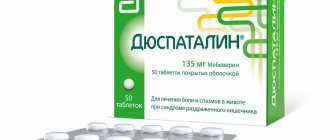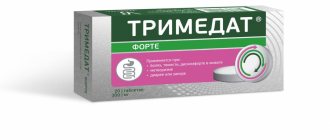Sparex 200 mg 30 pcs. extended release capsules
pharmachologic effect
Antispasmodic myotropic action, has a direct effect on the smooth muscles of the gastrointestinal tract (mainly the large intestine). Eliminates spasm without affecting normal intestinal motility. Inhibits phosphodiesterase. Stabilizes the level of cyclic adenosine monodiphosphoric acid. Does not have anticholinergic effects.
Composition and release form Sparex 200 mg 30 pcs. extended release capsules
Capsules - 1 capsule:
- Active substance: mebeverine hydrochloride 200 mg.
- Excipients: colloidal silicon dioxide (Aerosil) - 5 mg, hypromellose (hydroxypropyl methylcellulose) - 38 mg, povidone K90 - 5 mg, magnesium stearate - 2 mg.
- Composition of the hard gelatin capsule: body: titanium dioxide - 1.378 mg, gelatin - 44.522 mg, quinoline yellow dye - 0.308 mg, sunset yellow dye - 0.003 mg; cap: titanium dioxide - 0.893 mg, gelatin - 28.686 mg, quinoline yellow dye - 0.199 mg, sunset yellow dye - 0.002 mg;
10 pieces. — cellular contour packages (3) — cardboard packs.
15 pcs. — contour cell packaging (2) — cardboard packs.
Description of the dosage form
Extended-release hard gelatin capsules, size No. 1, yellow; the contents of the capsules are a mixture of granules and white or almost white powder; Lumps are allowed.
Directions for use and doses
Orally for adults and children over 12 years of age, 1 capsule (200 mg) 2 times a day 20 minutes before meals (morning and evening). Swallow whole with water.
Pharmacokinetics
When taken orally, it undergoes presystemic hydrolysis and is not detected in plasma. Metabolized in the liver to veratric acid and mebeverine alcohol. It is excreted mainly by the kidneys in the form of metabolites, and in small quantities by bile. Mebeverine capsules have sustained release properties. Even after repeated administration, no significant accumulation is observed.
Indications for use Sparex 200 mg 30 pcs. extended release capsules
In adults:
- spasm of the gastrointestinal tract (including those caused by organic disease);
- intestinal colic;
- biliary colic;
- irritable bowel syndrome.
For children over 12 years of age:
- functional gastrointestinal disorders accompanied by abdominal pain.
Contraindications
- Hypersensitivity;
- porphyria;
- pregnancy;
- children under 12 years of age (due to insufficient data on effectiveness and safety).
With caution: use during lactation.
Application of Sparex 200 mg 30 pcs. extended-release capsules during pregnancy and lactation
The use of the drug is contraindicated in children under 12 years of age (due to insufficient data on effectiveness and safety).
special instructions
During the treatment period, it is necessary to refrain from driving vehicles and engaging in potentially hazardous activities that require increased concentration and speed of psychomotor reactions.
Overdose
Symptoms: central nervous system stimulation. A specific antidote is unknown. Gastric lavage and symptomatic therapy are recommended.
Side effects of Sparex 200 mg 30 pcs. extended release capsules
Dizziness, headache, diarrhea, constipation.
Allergic reactions: urticaria, angioedema, facial swelling and exanthema.
Spark
Pharmacological properties.
Pharmacodynamics.
Mechanism of action and pharmacodynamic effects.
Spark is a myotropic antispasmodic with a selective effect on the smooth muscles of the digestive tract. It relieves spasms without inhibiting normal intestinal motility. Because this action is not mediated by the autonomic nervous system, there are no typical anticholinergic side effects.
Clinical efficacy and safety.
Significant improvements in the predominant symptoms of irritable bowel syndrome (eg, abdominal pain, stool characteristics) have generally been observed in peer-reviewed and outcome-controlled clinical studies.
All mebeverine dosage forms were generally safe and well tolerated at the recommended dosage regimen.
Children.
Clinical studies of tablets and capsules were conducted only in adults. Clinical efficacy and safety data from clinical studies, as well as post-marketing experience with mebeverine pamoate suspension in patients over 3 years of age, have demonstrated that mebeverine is an effective, safe drug that is well tolerated.
Clinical studies of mebeverine suspension have shown that it is effective in reducing the symptoms of irritable bowel syndrome in children. Further open-label, baseline-controlled studies of the mebeverine suspension confirmed the effectiveness of the drug.
The dosage regimen for tablets and capsules is based on the safety and tolerability of mebeverine.
Pharmacokinetics.
Absorption.
Mebeverine is rapidly and completely absorbed after oral administration in tablet form. Due to the prolonged release of the drug from the capsule, it can be taken twice a day.
Distribution.
With repeated use of mebeverine, no significant accumulation occurs.
Biotransformation.
Mebeverine hydrochloride is mainly metabolized by esterases, which in the first stage of metabolism cleave ester bonds to form veratric acid and mebeverine alcohol. In plasma, demethylcarboxylic acid (DMCA) is the main metabolite. The half-life of DMKK at steady state is 5.77 hours. With repeated use of capsules (200 mg 2 times a day), Cmax of DMKK was 804 ng/ml, and tmax was about 3 hours.
The relative bioavailability of extended-release capsules was found to be optimal with an average ratio of 97%.
Excretion.
Mebeverine is not excreted unchanged, it is completely metabolized, and the metabolites are excreted almost completely. Veratric acid is excreted in the urine. Mebeverine alcohol is also excreted by the kidneys in the form of the corresponding carboxylic acid (CA) or demethylcarboxylic acid (DMCA).
Children.
Pharmacokinetic studies have not been conducted in children.
Spark instructions for use
Composition: Active ingredient: 1 capsule contains mebeverine hydrochloride, pellets in terms of mebeverine hydrochloride 200 mg. Excipients in the pellet composition: spherical sugar, povidone, shellac, talc, methacrylate copolymer dispersion. Capsule shell composition: gelatin, titanium dioxide (E 171). Dosage form: Long-acting hard capsules.
Basic physical and chemical properties: Hard gelatin capsules. The capsule body is transparent, the cap is white. The contents of the capsules are granules (pellets) of white color, spherical in shape.
Pharmacological group: Drugs used for functional gastrointestinal disorders. Synthetic anticholinergics, esterified tertiary amines.
ATX code A0ZAA04.
Pharmacodynamics. Mechanism of action and pharmacodynamic effects. Spark is a myotropic antispasmodic with a selective effect on the smooth muscles of the digestive tract. It relieves spasms without inhibiting normal intestinal motility. Since this action is not mediated by the autonomic nervous system, there are no typical anticholinergic side effects.
Clinical efficacy and safety. Significant improvements in core symptoms of irritable bowel syndrome (eg, abdominal pain, stool characteristics) have generally been observed in reference-controlled, value-controlled clinical studies. All mebeverine dosage forms were generally safe and well tolerated at the recommended dosage regimen.
Children. Clinical studies of tablets and capsules were conducted only in adults. Clinical efficacy and safety data from clinical studies, as well as post-marketing experience with the use of mebeverine pamoate suspension in patients over the age of 3 years, demonstrated that mebeverine is an effective, safe drug that is well tolerated. Clinical studies of mebeverine suspension have shown that it is effective in reducing the symptoms of irritable bowel syndrome in children. Further open, baseline-controlled studies of the mebeverine suspension confirmed the effectiveness of the drug. The dosage regimen for tablets and capsules is based on the safety and tolerability of mebeverine.
Pharmacokinetics. Absorption. Mebeverine is rapidly and completely absorbed after oral administration in tablet form. Due to the prolonged release of the drug from the capsule, it can be taken twice a day. Distribution. With repeated use of mebeverine, no significant accumulation occurs. Metabolism. Meverine hydrochloride is mainly metabolized by esterases, which in the first stage of metabolism cleave ester bonds to form veratric acid and mebeverine alcohol. In plasma, demethylcarboxylic acid (DMCA) is the main metabolite. The half-life of DMKK at steady state is 5.77 hours. With repeated use of capsules (200 mg 2 times a day), the Cmax of DMCA was 804 ng/ml, and the tmax was about 3:00. The relative bioavailability of extended release capsules was found to be optimal with an average ratio of 97%. Conclusion. Mebeverine is not excreted unchanged, it is completely metabolized, and the metabolites are eliminated almost completely. Veratric acid is excreted in the urine. Mebeverine alcohol is also excreted by the kidneys in the form of the corresponding carboxylic acid (CA) or demethylcarboxylic acid (DMCA). Children: Pharmacokinetic studies have not been conducted in children.
Indications: Adults and children over 10 years of age: - symptomatic treatment of abdominal pain and cramps, intestinal disorders and intestinal discomfort in irritable bowel syndrome; - treatment of gastrointestinal spasms of secondary origin caused by organic diseases.
Contraindications: Hypersensitivity to the active substance or to any of the inactive components of the drug.
Types of interactions: Interaction studies with alcohol have been conducted. In vitro and in vivo animal studies have demonstrated the absence of any interaction between mebeverine hydrochloride and ethanol.
Features of use: Use during pregnancy or breastfeeding. There are only very limited data on the use of mebeverine in pregnant women. Reproductive toxicity studies in animals are lacking. Meverine hydrochloride is not recommended for use during pregnancy. It is unknown whether mebeverine or its metabolites are excreted in breast milk. The excretion of mebeverine into the breast milk of animals has not been studied. Spark ® should not be used during breastfeeding. There is no clinical evidence of effects on male or female fertility, but animal studies do not indicate harmful effects of mebeverine.
The ability to influence the reaction rate when driving vehicles or other mechanisms. No studies have been conducted on the effect on the ability to drive a car or operate machinery. The pharmacodynamic and pharmacokinetic profile, as well as post-marketing experience, do not indicate a harmful effect on the ability to drive a car and operate machinery.
Directions for use and dosage: For oral use. Take the capsules with a sufficient amount of water (at least 100 ml). Chewing is not recommended due to the capsule coating being designed to provide sustained release. Adults and children over 10 years old take 1 capsule 2 times a day (morning and evening). The duration of use is not limited. If one or more doses are missed, the patient should take the next dose as directed. Dose(s) missed should not be taken again. Special Populations: Dosing studies have not been conducted in elderly patients or patients with impaired renal and/or hepatic function. Considering the available post-marketing data, there is no specific risk for elderly patients, patients with impaired renal and / or liver function. Dose adjustment for the above groups of patients is not considered necessary. Children. Suitable for children aged 10 years and older.
Overdose: In case of overdose, excitation of the central nervous system may occur. In cases of mebeverine overdose, symptoms were absent or mild and disappeared quickly. Symptoms of overdose observed were of neurological or cardiovascular origin. A specific antidote is unknown. Symptomatic treatment is recommended. Gastric lavage is recommended only in case of intoxication with several drugs within 1:00 of taking the medications. Measures to reduce absorption are not necessary.
Adverse reactions: From the skin and subcutaneous tissue: urticaria, angioedema, facial swelling and rash. From the immune system: hypersensitivity (anaphylactic reactions).
Shelf life: 2 years. Do not use after the expiration date stated on the packaging.
Storage conditions: Store in original packaging at a temperature not exceeding 25°C. Keep out of the reach of children.
Packaging: 10 capsules in a blister. 3 or 5 blisters per pack.
Dispensing category: Prescription.
. Ukraine, 04080, Kyiv, st. Frunze, 74.

